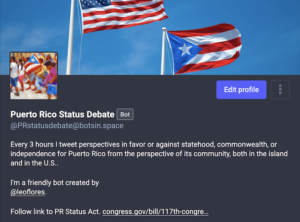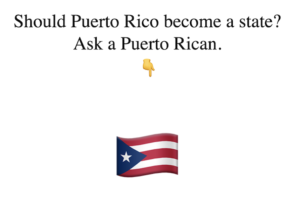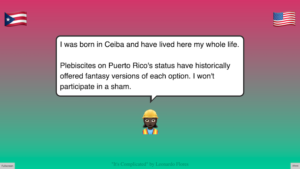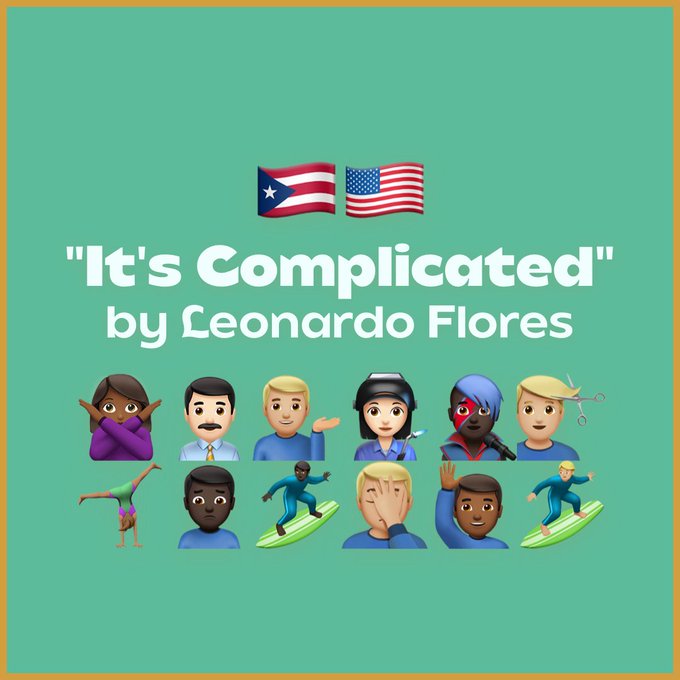This Spring, I created a series of works that explore Puerto Rico’s relation to the United States. It was catalyzed by the recent Puerto Rico Status Act, which seeks “to resolve Puerto Rico’s political status” with a plebiscite that offers “eligible voters a choice of independence, sovereignty in free association with the United States, or statehood.” This is the latest attempt to resolve an issue that has been central to my Puerto Rican people since the U.S. invaded Puerto Rico in 1898 and has become increasingly complex over 125+ years as our economies, culture, history, and politics have become entangled.
 The first iteration of this work took the form of two bots created for Twitter (@PRstatusdebate, which no longer functions since Twitter changed its Free API) and Mastodon (@PRstatusdebate@botsin.space). If you use Mastodon, you can follow it and get a perspective from a hypothetical Puerto Rican (from the island or the diaspora) offering real opinions on the three status options.
The first iteration of this work took the form of two bots created for Twitter (@PRstatusdebate, which no longer functions since Twitter changed its Free API) and Mastodon (@PRstatusdebate@botsin.space). If you use Mastodon, you can follow it and get a perspective from a hypothetical Puerto Rican (from the island or the diaspora) offering real opinions on the three status options.
 The second iteration is a minimalist version titled “Tentative” which was published in Taper #10: Powers of Ten. Because Taper requires works to be no larger than 2 kb in size (2048 bytes), I focused this work on perspectives in favor and against the prospect of statehood for Puerto Rico, once again keeping the perspective focused on Puerto Rican perspectives. This piece is interactive and asks readers to click on the emoji to randomly select a hypothetical boricua and a real perspective on the issue of statehood for la isla.
The second iteration is a minimalist version titled “Tentative” which was published in Taper #10: Powers of Ten. Because Taper requires works to be no larger than 2 kb in size (2048 bytes), I focused this work on perspectives in favor and against the prospect of statehood for Puerto Rico, once again keeping the perspective focused on Puerto Rican perspectives. This piece is interactive and asks readers to click on the emoji to randomly select a hypothetical boricua and a real perspective on the issue of statehood for la isla.

The most recently published and most complete exploration of this concept is “It’s Complicated,” commissioned and published by The Los Angeles Review as part of its Latinx e-lit folio. This version builds on both bot and Taper versions to create a time-based randomized exploration of the three status options, plus it adds statements rejecting the issue or the very idea of holding a referendum (thank you, Andie Pabón Thomas for this important idea). This version is designed for exhibition by having full screen capability, and unfolding over time. Each iteration takes 15 seconds to unfold: each emoji represents a hypothetical Puerto Rican that describes their provenance and 5 seconds later offers a perspective on the status issue. The random background colors help signal that it’s someone else in a different context.
So what do I think about this issue? My intent and opinions must be interpreted through the work(s). (Remember that I’m a literature professor: I’m not giving it away that easily). That being said, there are hints in the source code for both “Tentative” and “It’s Complicated,” which you can access in a computer (usually with a right click or through your browser’s menu bars). But whatever specific stance I might have about each status opinion– the works clearly express ideas that I don’t personally agree with– one point should become clear: there are many reasons why this is such a complex topic for my people and this might be why no previous attempts at resolving it have provided a clear mandate from our people, wherever we might be.
A final note: I created these works in English because my primary audience is USAmericans and other people around the world who might wonder how Puerto Ricans feel about this. Some of my compatriots might be triggered by these works– this is such a fiercely debated topic that it has broken families and friendships– and may take offense to not seeing their own perspectives reflected in the work. To them I say that I have tried to represent as many voices and perspectives as I’ve heard over the course of a lifetime of considering this issue. And I hope people can at least use them to at least have a more nuanced understanding of our neocolonial condition and the imperfect choices that lie before us.
